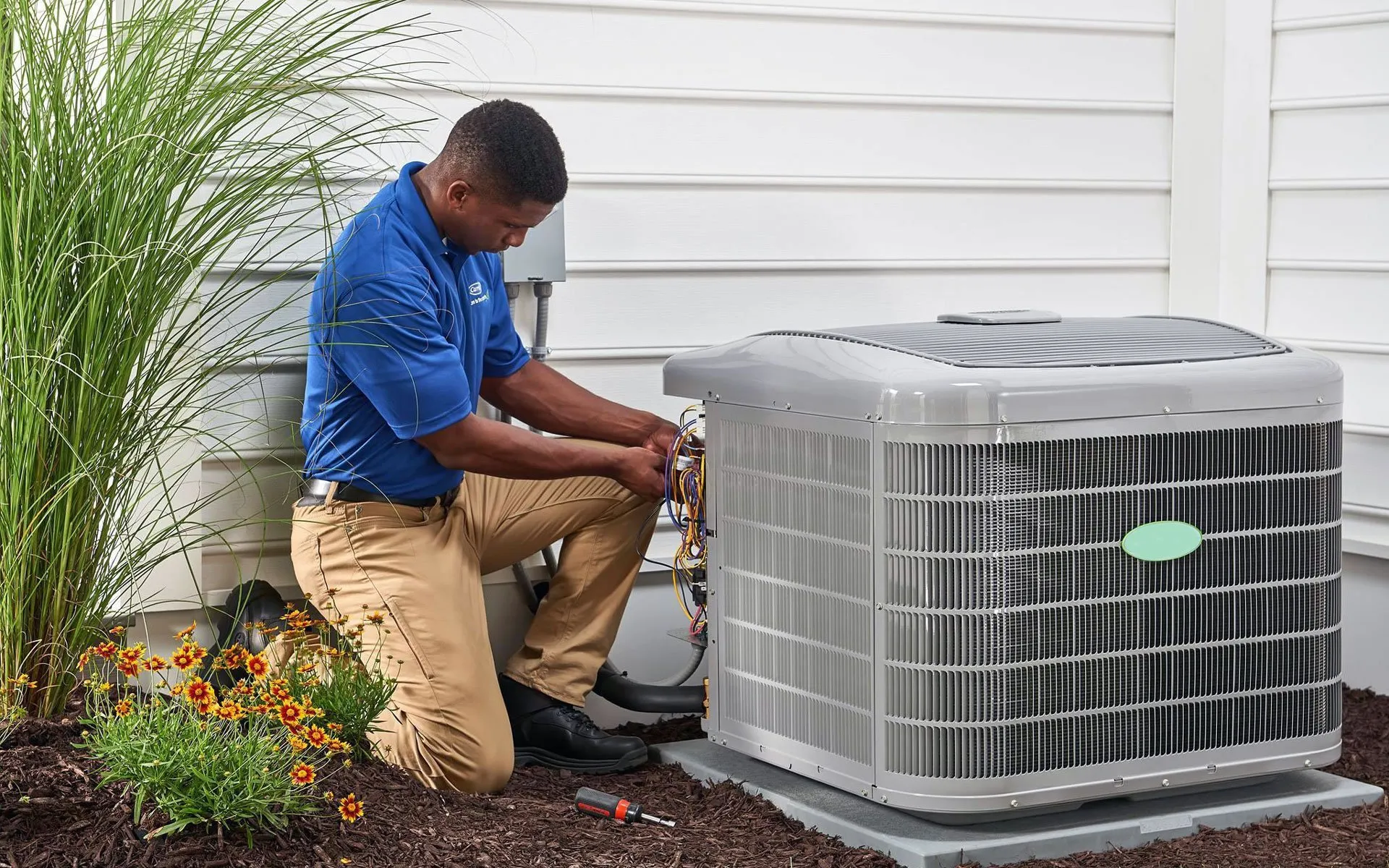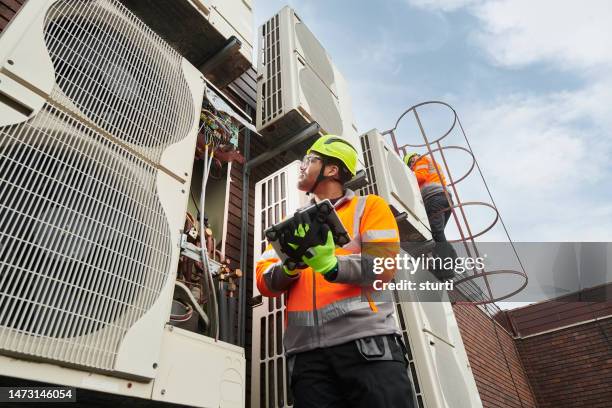Choosing In Between a Heatpump and Heater: Secret Factors To Consider for Your Cooling And Heating Needs
When assessing home heating alternatives for a/c needs, the choice in between a warmth pump and a furnace can be intricate. Each system supplies unique benefits customized to details environments and energy effectiveness goals. Comprehending these differences is vital for making an informed choice. Trick factors such as installation prices and environmental influence better make complex the choice procedure. Which alternative really straightens with one's convenience and sustainability choices? The adhering to areas will check out these factors to consider carefully.
Recognizing Warm Pumps: Exactly How They Work and Their Benefits
While several home owners take into consideration different heating choices, recognizing just how heat pumps feature and their advantages can greatly influence their decision. Heat pumps operate by moving warmth instead of producing it. In the wintertime, they extract warmth from the outside air or ground and transfer it inside, while in the summertime, they reverse this procedure, cooling down the home by eliminating heat outside. This dual performance makes them flexible for year-round climate control.One of the key advantages of heat pumps is their energy effectiveness. They use substantially less electrical energy compared to typical heating unit, possibly leading to lower energy expenses (heat pump replacement ooltewah tn). Additionally, warm pumps have a smaller sized carbon impact, making them an eco-friendly choice. They also require less maintenance than standard systems, adding to lasting cost financial savings. Overall, comprehending the mechanics and advantages of heatpump can help homeowners make informed decisions regarding their heating and cooling down demands
Checking Out Heaters: Types, Operation, and Benefits
Furnaces are available in various types, including gas, electric, and oil designs, each with distinctive functional devices. Recognizing these differences is vital, as they influence performance and heating performance. Additionally, heaters provide countless advantages, such as regular heat result and reliability in colder climates.
Types of Heating systems
Heating unit can vary significantly in design and operation, with heaters being a popular choice amongst house owners. There are a number of kinds of heaters, each utilizing various gas resources and innovations. Gas furnaces prevail, leveraging gas to generate warm effectively. Electric heaters, on the various other hand, make use of electric resistance to generate heat, frequently preferred for their uncomplicated setup. Oil heating systems, while less usual, work in locations with minimal gas gain access to (ductless mini splits). In addition, condensing heating systems make best use of power efficiency by catching and reusing exhaust gases. Each kind operates with a system of warmth exchangers and ductwork to distribute warm air throughout a home. Understanding the distinctions in between these heating system kinds is important for educated cooling and heating decisions
Advantages of Heaters
For home owners seeking trustworthy warmth during cool months, the advantages of heating systems are considerable. Heating systems give regular home heating, making sure even temperatures throughout the home. They are particularly efficient in severe cold, typically exceeding heatpump in cold problems. Various kinds, including gas, electrical, and oil furnaces, supply adaptability to satisfy varied needs and preferences.Furnaces additionally tend to have lower first installation prices compared to warm pumps, making them a more accessible option for many. Their robust style contributes to a much longer life-span, with many units lasting over 15 years with correct maintenance. In addition, modern heating systems are frequently furnished with advanced modern technology for enhanced effectiveness, which can bring about minimized power costs. Overall, heating systems stay a reliable selection for reliable home heating.

Power Efficiency: Contrasting Heat Pumps and Furnaces
When comparing power performance in between warmth pumps and heaters, the Seasonal Power Effectiveness Proportion (SEER) plays an important role in identifying efficiency. Additionally, a functional expense evaluation reveals the lasting economic implications of each system. Recognizing these variables can lead home owners in making notified decisions regarding their heating solutions.
Seasonal Energy Efficiency Proportion
Power performance plays a necessary duty in the decision-making process between warmth pumps and furnaces, particularly when taking into consideration the Seasonal Energy Effectiveness Ratio (SEER) This metric measures the cooling performance of heat pumps over a whole cooling period, providing a standard method to evaluate performance. Greater SEER scores suggest greater power performance, translating to reduced energy consumption and minimized energy expenses. In contrast, furnaces are typically assessed utilizing the Yearly Fuel Utilization Performance (AFUE) ranking, which shows home heating effectiveness. When comparing these two systems, homeowners should focus on SEER rankings for warmth pumps, as they directly impact total power financial savings and environmental sustainability. A comprehensive understanding of SEER can especially affect the lasting contentment and cost-effectiveness of the picked HVAC solution.
Functional Cost Analysis
Recognizing the functional costs associated with heatpump and furnaces is essential for homeowners reviewing their choices. Heatpump generally provide greater energy performance, transforming electrical energy right into warmth with very little waste. This causes reduced monthly energy bills, specifically in moderate environments. On the other hand, traditional heaters, specifically gas designs, might have lower ahead of time prices however can incur greater functional costs with time as a result of sustain costs and efficiency ratings.Moreover, heatpump can function as both heating and cooling down systems, potentially reducing the requirement for different cooling and heating systems. While first investments for heat pumps may be higher, their long-lasting cost savings in power performance can make them an extra affordable selection for numerous households. Cautious evaluation of neighborhood energy prices is necessary to identify the finest alternative.
Installment Prices: What to Anticipate for each and every Furnace
Installation costs for heater can vary substantially between heatpump and heaters, affecting homeowners' choices. Warmth pumps typically have higher ahead of time installment prices, generally ranging from $3,500 to $8,000, relying on the system dimension and complexity of setup. This includes the outside device, interior handling system, and essential ductwork modifications. Alternatively, furnaces have a tendency to have reduced first prices, balancing in between $2,500 and $6,000, which can be appealing for budget-conscious house owners. Nonetheless, installment costs can boost if considerable ductwork is required.Moreover, my site the selection of fuel kind for heating systems-- gas, lp, or electrical-- can additionally affect setup costs. While heatpump supply energy efficiency, their first investment might discourage some buyers. Ultimately, evaluating installation prices together with long-term dig this savings and performance will aid house owners in making notified decisions regarding their heater.
Environment Considerations: Which System Performs Better in Your Area
Just how do climate problems influence the performance of heater? The efficiency of heatpump and heating systems can vary greatly depending upon the local climate. In modest climates, warmth pumps stand out by successfully transferring warmth from the outside air, making them an energy-saving alternative. However, their performance decreases in exceptionally chilly temperature levels, where they may battle to extract adequate warm. Alternatively, heating systems, specifically gas designs, supply regular and reputable warmth despite exterior conditions, making them more suitable in cooler regions.In areas that experience milder wintertimes, heatpump can run efficiently year-round, offering both cooling and heating. On the other hand, regions with severe winters frequently profit from the effectiveness of furnaces. Inevitably, recognizing the neighborhood environment is crucial when deciding between a heat pump and a heating system, as it directly impacts their operational efficiency and overall performance.
Upkeep Requirements: Long-Term Treatment for Heat Pumps vs. Furnaces
While both heatpump and heaters require routine maintenance to guarantee peak efficiency, their details demands and care regimens vary considerably. Furnaces typically require less constant interest, with yearly examinations being enough to inspect for gas leakages, tidy filters, and evaluate general performance. Their simpler style usually permits straightforward repairs.In comparison, warm pumps necessitate biannual upkeep due to their twin duty in cooling and heating. This includes cleansing coils, checking refrigerant levels, and making certain that both the indoor and outside systems function at their ideal. In addition, heatpump upkeep commonly involves more intricate parts, making professional maintenance essential.Neglecting upkeep can result in reduced efficiency and boosted power costs for both systems. Ultimately, house owners should think about these long-term treatment demands when choosing between a warm pump and a heater, as positive upkeep can prolong the life-span and efficiency of either system significantly.
Environmental Influence: Selecting a Sustainable Home Heating Choice
The ecological effect of heater is a vital analysis for homeowners seeking sustainable options. Heatpump are generally much more energy-efficient than traditional furnaces, as they transfer warm rather than create it, greatly decreasing carbon discharges. By using renewable resource resources, such as geothermal or air-source heatpump, property owners can even more lessen their ecological footprint.On the various other hand, all-natural gas heaters send out greenhouse gases and contribute to air pollution, though they often give higher heat result. Developments in innovation have led to the growth of high-efficiency heating systems that minimize emissions.Ultimately, picking a heating system involves considering effectiveness against environmental effect. Homeowners are encouraged to mirror on local energy resources and rewards for eco-friendly systems, guaranteeing a choice that straightens with both individual convenience and environmental click this link responsibility. The decision influences not only immediate convenience however additionally lasting sustainability and ecological health.
Regularly Asked Questions
The Length Of Time Do Warmth Pumps and Furnaces Usually Last?
The lifespan of heatpump typically ranges from 15 to two decades, while furnaces can last in between 15 to three decades. Routine maintenance considerably influences their durability and performance in providing heating solutions.
Can I Utilize a Warmth Pump in Extremely Cold Climates?
Heat pumps can run in extremely chilly environments, but their effectiveness decreases as temperatures decline. In such problems, supplementary home heating resources may be needed to preserve comfy indoor temperatures and ensure peak efficiency.

What Is the Noise Degree of Warmth Pumps Versus Furnaces?
The noise levels of heatpump and heaters vary considerably. Generally, heatpump run more quietly than conventional furnaces, making them better for those conscious sound, while heating systems may produce louder operational noises throughout heating cycles.
Are Heat Pumps Suitable for Both Home Heating and Cooling?
Heat pumps are indeed ideal for both cooling and heating (heat pump installation ooltewah tn). They work by transferring warm, giving effective temperature control year-round, making them a flexible selection for house owners seeking an all-in-one cooling and heating remedy
What Dimension Heater Do I Need for My Home?
Establishing the suitable dimension heater for a home needs evaluating elements such as square video, insulation high quality, neighborhood climate, and the home's design. Consulting a professional can ensure an exact analysis and suitable comfort. Heat pumps normally supply higher power efficiency, transforming electrical power into heat with minimal waste. In moderate climates, warm pumps succeed by efficiently transferring warmth from the outside air, making them an energy-saving option. On the other hand, furnaces, particularly gas designs, provide constant and dependable warm no matter of outside problems, making them preferable in colder regions.In locations that experience milder winter seasons, warm pumps can run efficiently year-round, supplying both home heating and cooling. Warmth pumps are typically a lot more energy-efficient than typical heating systems, as they move warmth instead than create it, greatly reducing carbon discharges. By making use of renewable energy resources, such as air-source or geothermal warm pumps, homeowners can better lessen their eco-friendly footprint.On the other hand, natural gas heating systems emit greenhouse gases and contribute to air contamination, though they commonly give greater warm output.